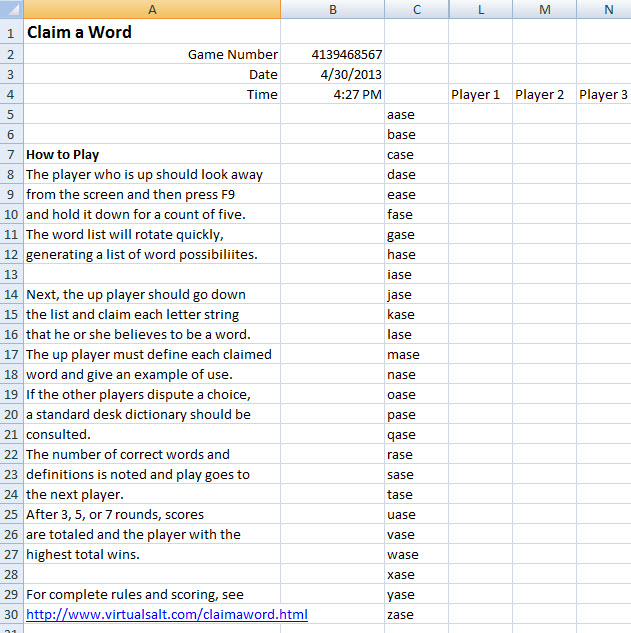Claim a Word is an easy game built into this Microsoft Excel spreadsheet. Players’ knowledge of simple words is tested by presenting them with a list of 26 randomly generated possible words, each beginning with a different letter of the alphabet. Players must identify which of the possibilities are words and which are not. The game can be played by one, two, or three players or more if joined into teams. It is recommended that you print each word list to prevent inadvertently recreating a new list in the middle of play. Printing also has the advantage of allowing you to generate several game sheets and take them with you in the car, on the plane, to the beach or elsewhere.

Play
Play begins by opening the spreadsheet. In the spreadsheet, the player who is up should hold down the F9 function key for a count of five.
Caution: Each input to the spreadsheet will recreate a new word list, so if you want to use the columns labeled Player 1 and so forth to keep score PRINT the spreadsheet and write the scores on the printout.
On the printout or the spreadsheet the player should go down the list and claim each letter string that he or she believes to be a word. In order to score, the player must define each claimed word and give an example of use. If the other players dispute a choice, a standard desk dictionary should be consulted.
When the up player has identified all the words possible, play goes to the next player.
The new up player first has the opportunity to claim any words in the list that the previous player missed.
Then the new player holds down the F9 key for a count of five to get a new list.
Scoring
Each correctly claimed word earns the player one point. The number of correct words and definitions is noted and play goes to the next player.
Players should agree on the following scoring rules before play begins:
1. American spelling only, British spelling only, or both spellings allowed.
2. Words formed from other words, though the form might not be in the dictionary. Example: In the word list shown in the graphic, tase is formed from Taser, lase from laser, and mase from maser.
3. Acronyms or actual words only. In the list in the graphic, sase is an acronym (self addressed stamped envelope).
4. Abbreviations or actual words only.
If the new player identifies words in the previous player’s list, each newly identified word scores two points.
Play continues until each player has played a set number of rounds, (recommended is 3, 5, or 7 dependint on the number of players). The player with the highest total wins. Alternatively, play continues until one player reaches 100 points.
Rule Variations
Desired rules must be claimed and agreed upon in advance of play.
Those who like to punish errors can claim the error rule which is to subtract a point for each string wrongly claimed to be a word. Those who like to punish imperfection can claim the oversight rule where a point is subtracted for each actual word not claimed by the up player.
Those who want actual words only, as defined by their presence in the reference dictionary, can claim strict rules.
Spreadsheet Note
The game number is a combination of the date and time, rendered into a number string. Thus, each game has a unique identifier. And for the third time, it’s best to print the game sheet to avoid accidentally recreating a new word list.
To get the spreadsheet, click here.